The mute men in blue have been performing their act in Boston since 1995, combining comedy and musical sketches with percussion instruments and neon oceans at the Charles Playhouse.
After pandemic-related closures and a brief hiatus in 2023, the Blue Man Group resumed its year-round performance schedule at the roughly 500-seat theater, hosting a Q&A session with journalists before their main act last Thursday night.
But even within their over 30-year tenure, the act has been ever-changing, especially with Cirque du Soleil acquiring Blue Man Group Production in 2017, helping them maintain their six residences in cities from New York to Vegas to Berlin, and launching the 2024 Bluevolution World Tour which just wrapped up in the U.K. and Europe this week.
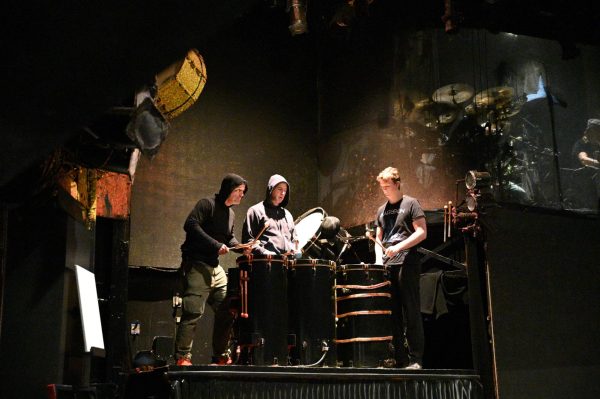
The group strives to adapt the show for younger audiences while staying true to their ‘90s roots.
Shows from the 2010s featured large-scale iPhones for the Blue Men to get up to trouble with. Recently, while surrounded by LED screens and live cameras, the Blue Men interacted with AI Orb which allowed them to make instant online purchases and culminated in the syncopated chewing of comically large Captain Crunch.
“It’s always about keeping the show fresh and updating it with new elements that are current, things that will resonate with a … family audience,” said Corey Phillips, the senior associate company manager for Blue Man Boston.
The current show calls back to the art movements of their inception, like the work of nouveau réalisme French painter, Yves Klein, who inspired the specific blue the men use, and whose work is more directly referenced in a recent sketch used in the show. While retaining the spirit of a very specific moment in New York’s downtown art scene, today’s show is now reimagined with exploding drums in playful blue and still boasts the company’s trademark industrial aesthetic of PVC pipes and gray jumpsuits.
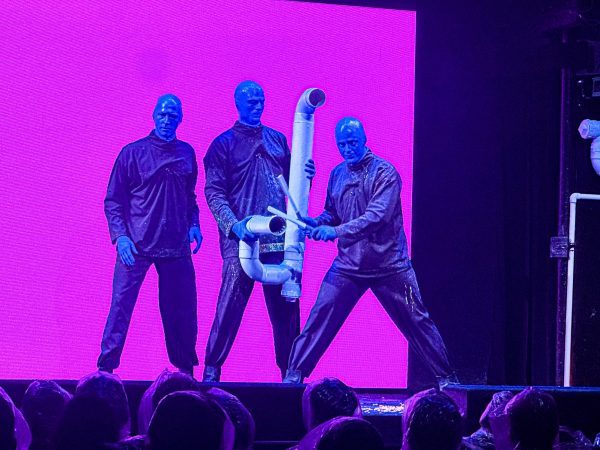
“Since then, the co-founders and the creators, they’ve all grown up [and] had families of their own,” Phillips said. “So the things that were current in their lives evolved and changed, and that’s kind of how the show has evolved as well.”
The show satirizes everything from the impacts of social media and retail therapy to big pharma and mass surveillance.
Meant to be a universal figure, the Blue Man character was chosen to reflect innocence and the sense of common bond that the show is all about, Adam Erdossy, a Blue Man from Vermont currently living in Walden, told journalists.
“What the original three Blue Men discovered very quickly in creating the character is when you strip away certain elements, you take away the things that we identify people with immediately like hair, ears, voice,” Erdossy said. “It actually brings out this inner life that comes from a really deep and pure place that everybody can connect to.”
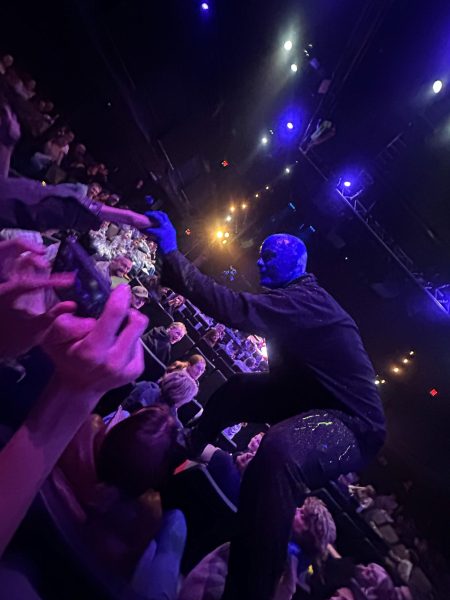
Erdossy studied theater at Wheaton College, trained at the National Theater Institute in Waterford, Conn., and has performed with Blue Man Group since 2006. Bringing his classical training to a project like Blue Man, he said he finds unique challenges in the pantomime style of performance.
Erdossy says the hardest part of his job is trying not to smile on stage from all the fun he has as a Blue Man.
“What’s beautiful about it is the fact that it’s not really us. I’m not on the marquee … I’m a part of the community. The Blue Man character is really just part of the community of a Blue Man Group,” Erdossy said.
That “community” encompasses not only the 70 or so active Blue Men performers, but also supporting musicians, tech crew, and the wardrobe, electric, carpentry, and automation departments that bolster the backstage elements of the show.
It takes 45 minutes of makeup for the cast to go from everyday life to decked out in their signature blue.
“I really love the autonomy that during the show, no one knows that it’s me … there’s something freeing about that. The blue acts as a sort of neutral mask,” Jason McLin, the Blue Man captain for Boston, told The Beacon.
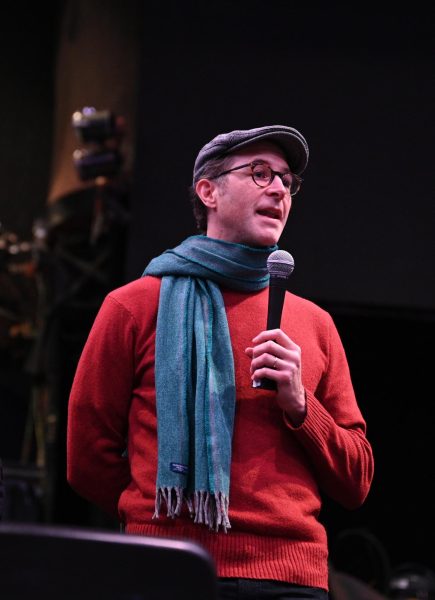
McLin compared the act to traditional commedia dell’arte theater where actors also cloak their faces with masks. Having been involved with the company for over a decade, he praised the ever-evolving nature of the show, though it is strictly scripted.
“It’s a perpetual state of rehearsal that we get the opportunity to come up night after night and commit ourselves to. It unfolds as it’s going to unfold, and then we sort of reflect on that and get to do it again,” McLin said.
The majority of the company did not originate in Massachusetts or Boston, instead migrating from other areas and finding residency here to be a part of the group. For many of them, the stability of attaching to a long-running performing company not based in New York City was a big draw.
“I’m one of those people who is very proud to say that I’ve been able to work consistently in theater since I graduated college. And this is definitely one of those reasons for that,” Paul Marr, an electric supervisor who has worked with the Blue Man Group for 24 years, said during the panel.
Eliot Mohrmann, the wardrobe and makeup supervisor for Blue Man Boston, also found themselves unexpectedly making their career with the company.
“It wasn’t what I would have said I wanted to be when I grew up, but it is what I want to be now that I grew up,” Mohrmann said.
The production is full of moving parts, and, true to form, many of them are meant to appear improvised even when meticulously rehearsed.
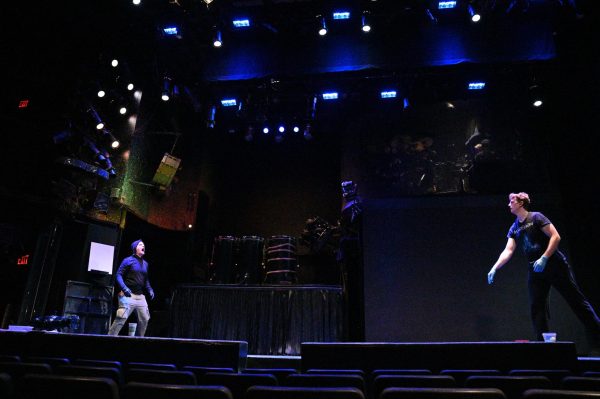
The band doesn’t have sheet music for their performances, Randy Wooten, the resident music director and drummer for the band, told journalists.
“[The] music is taught orally and handed down in a community setting,” Wooten, who studied jazz at the New England Conservatory of Music in Boston, explained. “Every night in those moments where there’s intangibles, we have to be able to respond and react to them in real-time.”
The band accompanying the performance also provides sound effects and stingers for the show on their instruments in addition to composed songs.
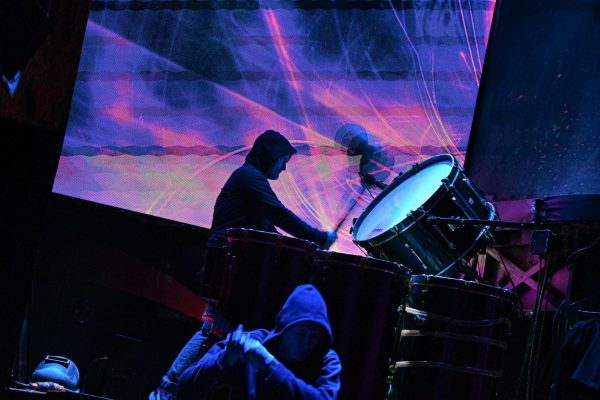
“There are all these nuanced moments that are in the moment, and that speaks to the uniqueness of the show,” Wooten said. “It starts with the mystery of the characters and then how they start to connect to the audience and how they eventually bring people on stage. That arc of connection can’t be practiced.”
Spencer Marchant, a Salt Lake City native who was pulled up on stage to participate in a bit where the Blue Men made a portrait by covering him in paint, said this was his first time seeing the group perform.
“They gave me a little bit of heads up ahead of time, so I wasn’t as surprised as maybe I should have been,” Marchant said. “My kids loved it. They were excited to watch me up there.”
Pam Sanders was more hesitant; the Ohio native in Boston on vacation was brought on stage for a series of sketches that lasted almost 20 minutes and included a mock wedding, a game of twister, and lots of awkward silences.
“I was freaking out. I was probably the last one in the crowd that wanted to go up there,” Sanders said. Despite her reservations, Sanders became a crowd favorite, even receiving a shout-out from other audience members who were later pulled on stage.
Despite their commitment to universalism, the Blue Man Group has embedded itself deeply into Boston’s local culture, especially during its long run in the city.
“I think most people in Boston felt ownership over the show because they thought it started here, which is actually factually incorrect,” Darren Ray, a string player with the group, told The Beacon. “And if you know the people in Boston, if we feel ownership over something, we tend to pass that on to our friends.”
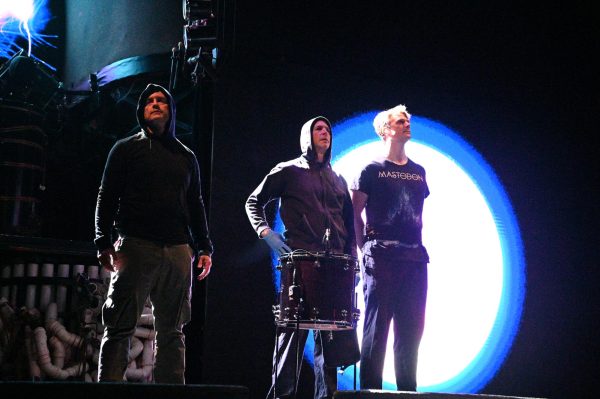
No matter where they go, whether they are playing with PVC pipes or smartphones, the Blue Men’s greatest mission seems to be spreading joy, acceptance, and hope.
“The Blue Man has no real sense of himself or like judging … that kind of nascent, pure, innocent mentality is a really beautiful way to spend your day,” Erdossy said.